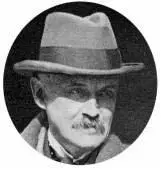Leo Maxse

Leopold Maxse, the younger son of Admiral Frederick Augustus Maxse (1833–1900), was born in London on 11th November 1864. He was educated at Harrow School and King's College and was elected as president of the Cambridge Union.
After leaving Cambridge University he went to live with his brother in India. He also visited Australia, New Zealand, Canada, and the USA. According to his biographer, Andrew S. Thompson: "This world tour proved to be a key period in Maxse's life. Not only did he gather a large fund of knowledge about colonial society and politics, but many important contacts were made with local journalists and politicians. On returning to England, Maxse married, in 1890, Katharine (died 1922), the eldest daughter of Vernon Lushington KC; there were no children."
In 1893 his father purchased The National Review. The editor, Alfred Austin was dismissed and Leo Maxse became the new boss of the journal. He supported the Conservative Party and was a fierce critic of the Liberal Party. Maxse complained that while professing to be concerned for the poor, they lived lives of self-indulgence. He also accused Herbert Henry Asquith of "muzzling the press by bestowing honours and titles on newspaper editors and press lords".
Maxse favoured an alliance with France against the threat of Germany. Andrew S. Thompson has pointed out: "Fear of Germany's economic and military strength developed into an unhealthy obsession with conspiracy theories. A keen spy-hunter, on one occasion he is even said to have advised a close friend to dispense with the services of his German nanny, whose lengthy bicycle rides in the English countryside were enough to convince Maxse that she was a secret agent."
During the First World War Maxse claimed the existence of a secret society called the Unseen Hand. As Ernest Sackville Turner, the author of Dear Old Blighty (1980) has pointed out: "One of the great delusions of the war was that there existed an Unseen (or Hidden, or Invisible) Hand, a pro-German influence which perennially strove to paralyse the nation's will and to set its most heroic efforts at naught... As defeat seemed to loom, as French military morale broke and Russia made her separate peace, more and more were ready to believe that the Unseen Hand stood for a confederacy of evil men, taking their orders from Berlin, dedicated to the downfall of Britain by subversion of the military, the Cabinet, the Civil Service and the City; and working not only through spiritualists, whores and homosexuals."
This view was supported by Lord Northcliffe (the owner of The Times, The Daily Mail and London Evening News), Lord Beaverbrook (The Daily Express), the journalist, Arnold Henry White (the author of The Hidden Hand), Ellis Powell (the editor of the Financial News), Horatio Bottomley (the editor of John Bull) and the former soldier, Harold S. Spencer, that the Unseen Hand was working behind the scenes to obtain a peace agreement with Germany.
After the Armistice Maxse continued to urge the British government to prepare for another war with Germany. He was also a strong critic of League of Nations and claimed that it would be unable to stop future wars. As well as editing the The National Review Maxse also edited anonymously the evening paper, The Globe, a newspaper owned by Lord Beaverbrook, between 1917 and 1921.
Leo Maxse died at his home, 27 Pembroke Gardens, Kensington, on 22nd January 1932.
